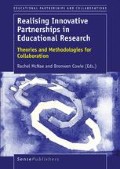Abstract
Sustainability education emphasises that empowerment of learners is essential to foster the transformations in ways of living that are necessary for individuals and society to move towards a more sustainable future. Empowerment has roots in the forms of democratic participation that can be embodied in community partnerships.
Access this chapter
Tax calculation will be finalised at checkout
Purchases are for personal use only
Preview
Unable to display preview. Download preview PDF.
References
Aguayo, C. (2014). The use of education for sustainability websites for community education in Chile. Doctor of Philosophy Thesis, The University of Waikato, Hamilton, New Zealand. Retrieved from http://hdl.handle.net/10289/8640
Aguayo, C. (2016). Activity theory and community education for sustainability: When systems meet reality. In D. Gedera & J. Williams (Eds.), Activity theory in education: Research and practice (pp. 139–152). Rotterdam, the Netherlands: Sense Publishers.
Allen-Gil, S., Walker, L., Thomas, G., Shevory, T., & Shapiro, E. (2005). Forming a community partnership to enhance education in sustainability. International Journal of Sustainability in Higher Education, 6(4), 392–402.
Ballantyne, R., & Packer, J. (2005). Promoting environmentally sustainable attitudes and behaviour through free-choice learning experiences: What is the state of the game? Environmental Education Research, 11(3), 281–295.
Daly, H. E. (1996). Beyond growth. Boston, MA: Beacon Press.
Davis, B., & Sumara, D. (2005). Complexity science and educational action research: Toward a pragmatics of transformation. Educational Action Research, 13(3), 453–464.
Enviroschools. (2015). Enviroschools programme Retrieved from http://www.enviroschools.org.nz/
Eryaman, M. Y., Yalcin-Ozdilek, S., Okur, E., Cetinkaya, Z., & Uygun, S. (2010). A participatory action research study of nature education in nature: Towards community-based eco-pedagogy. International Journal of Progressive Education, 6(3), 26–37.
Falk, J. H. (2005). Free-choice environmental learning: Framing the discussion. Environmental Education Research, 11(3), 265–280.
Heimlich, J. E., & Ardoin, N. M. (2008). Understanding behavior to understand behavior change: A literature review. Environmental Education Research, 14(3), 215–237.
Israel, B. A., Eng, E., Schulz, A. J., & Parker, E. A. (2012). Introduction to methods for CBPR for health. In B. A. Israel, E. Eng, & A. J. Schulz (Eds.), Methods for community-based participatory research for health (2nd ed.). Somerset, NJ: John Wiley & Sons.
Jensen, B. B., & Schnack, K. (1997). The action competence approach in environmental education. Environmental Education Research, 3(2), 163–179.
Kawabe, M., Kohno, H., Ikeda, R., Ishimaru, T., Baba, O., N, H., …, Yap, M. (2013). Developing partnerships with the community for coastal ESD. International Journal of Sustainability in Higher Education, 14(2), 122–132.
Lishawa, S., Schubel, A., Varty, A., & Tuchman, N. (2010). Sustainability education as a catalyst for university and community partnerships. Metropolitan Universities, 21(1), 58–72.
Ministry of Education. (2007). The New Zealand curriculum. Wellington, New Zealand: Learning Media.
Morrison, K. (2002). School leadership and complexity theory. London, England: RoutledgeFalmer.
Orr, D. A. S. P. (1992). Ecological literacy: Education and the transition to a postmodern world. Albany, NY: SUNY Press.
Tilbury, D., & Wortman, D. (2005). Whole school approaches to sustainability. Geographical education, 18, 22–30.
Wals, A. E. J., & Dillon, J. (2013). Conventional and emerging learning theories In R. B. Stevenson, M. Brody, J. Dillon, & A. E. J. Wals, (Ed.), International Handbook of Research on Environmental Education (pp. 253–261). New York, NY: Routledge. Rerieved from http://www.unesco.org/education/tlsf/mods/theme_a/mod02.html?panel=2-top
Author information
Authors and Affiliations
Editor information
Editors and Affiliations
Rights and permissions
Copyright information
© 2017 Sense Publishers
About this chapter
Cite this chapter
Aguayo, C., Eames, C. (2017). Community Partnerships in Sustainability Education Research. In: McNae, R., Cowie, B. (eds) Realising Innovative Partnerships in Educational Research. Educational Partnerships and Collaborations. SensePublishers, Rotterdam. https://doi.org/10.1007/978-94-6351-062-2_24
Download citation
DOI: https://doi.org/10.1007/978-94-6351-062-2_24
Publisher Name: SensePublishers, Rotterdam
Online ISBN: 978-94-6351-062-2
eBook Packages: EducationEducation (R0)

